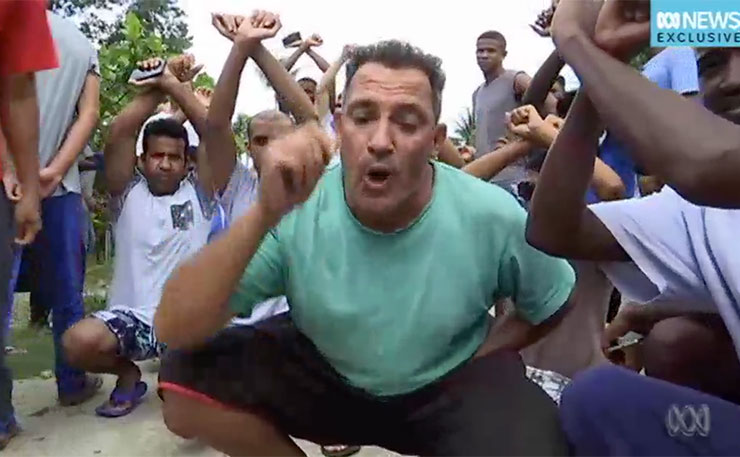The crisis unfolding on Manus Island is a new low in Australian political life. The solution lies in strongly opposing the men and women in power oppress some of the most vulnerable people on earth, writes Dr Nick Riemer.
As the crisis on Manus Island deepens, it’s easy to forget the reason the detention centre is closing in the first place: the PNG Supreme court found that imprisoning Australia’s refugees breached their fundamental rights, and was therefore unconstitutional.
How are those same human rights being respected now?
There are still over 600 refugees in what remains of the centre, where the water has been cut off, the generators removed on trucks, and all food, medicine and security withdrawn. In essence, our government is telling asylum seekers that they can die in the jungle.
Australia’s new colleagues on the UN Human Rights Council – refugee and human rights abusers like Hungary, Saudi Arabia, the US, and Kyrgyzstan – will be impressed.
 The men refuse to leave for a simple reason: they have nowhere safe to go. The new ‘accommodation’ is not even ready, but even when it is, it will offer them no protection against the attacks that already claimed the life of Reza Barati. Already the camp has been looted.
The men refuse to leave for a simple reason: they have nowhere safe to go. The new ‘accommodation’ is not even ready, but even when it is, it will offer them no protection against the attacks that already claimed the life of Reza Barati. Already the camp has been looted.
What would we give for a justice system in Australia as clear-eyed about the rights of refugees as PNG’s? In almost 20 years of Australian crimes against asylum, the depths to which a government has descended have rarely been more obvious than now.
The vicious ingenuity of Australian politicians has managed to find an even worse punishment than locking men up on Manus: ‘releasing’ them. All the paradoxes of Australia’s persecution of refugees – refugees as a threat to our borders; indefinite, torturous imprisonment as respect for human rights – are crystallized in the astonishing photographs of the Manus men repairing the very fences that imprison them, in order to protect themselves from the attacks with which they have been threatened.
As always, the question arises over what people in Australia can do. We could do worse than to look at how civil society has handled another question of significant social importance. The equal marriage campaign offers proof of the capacity of social movements to successfully press the claims of justice and equality against politicians’ intransigence.
This is what we need for refugees.

Already on tiny Manus itself, a petition organized by the Manus Alliance Against Human Rights Abuse calling on Australia to properly treat the refugees for which it is responsible has gained over three hundred signatures. If only a similar proportion of the population of affluent, ‘advanced’ Australia would speak up too.
The large and powerful public demonstrations seen in recent months in support of the ‘yes’ campaign do not just spring from the outrage experienced by many protesters at the evasions, conservatism and irresponsibility of Federal Parliament. They also, surely, come from the belief that history is on the side of marriage equality, and that in demonstrating their support for it, people do not risk the embarrassment of finding themselves barracking for the losing team.
The near absence of public demonstrations in favour of ‘no’ speaks to the equivalent calculation – people do not want to come out on the street for a cause that seems lost in advance.
A paradox of grassroots politics is that people are most likely to participate when they think they are going to win anyway. That is what political confidence and momentum consist in. But even the equal marriage campaign started somewhere.
Only recently, the idea that same-sex couples should not be discriminated against in the institution of marriage struck many as outlandish. But protests, initially small ones, gradually swung public opinion and created the momentum our society is swept up in today.
Protest movements need early adopters. For the refugee movement to become the force for change to which it aspires, it is still, even after 20 years, early days. But we have to be ready to protest – against the sadistic bigotry of One Nation and the LNP, and against the shameful quietism of the ‘great Australian Labor Party’, the party responsible for reopening Manus, whose deafening silence over the last few days should permanently disqualify it from any pretence to a genuine commitment to social justice or equality.
 Necessarily, protesting means taking an oppositional stance – not a ‘constructive’, ‘realistic’, or ‘pragmatic’ one, as so many ‘responsible’ official voices urge us. Accepting the status quo, or limited concessions on refugees is often presented as a political necessity, a down-payment we have to make, holding our nose, for the sake of not compromising ‘progressive’ politics in other areas.
Necessarily, protesting means taking an oppositional stance – not a ‘constructive’, ‘realistic’, or ‘pragmatic’ one, as so many ‘responsible’ official voices urge us. Accepting the status quo, or limited concessions on refugees is often presented as a political necessity, a down-payment we have to make, holding our nose, for the sake of not compromising ‘progressive’ politics in other areas.
How often do we hear that Labor will be better on so many things, but that mandatory detention and offshore processing are the price we have to pay?
But refugee-abuse is not a side issue. A politician from any side who does nothing in the face of abuses of this magnitude cannot be trusted to uphold any ethical principle to which they claim to be committed.
In demanding that all asylum seekers immediately be brought to Australia and released into the community, refugee supporters have all the pragmatism and realism we need – the pragmatism and realism that consist in insisting that our society simply cannot afford to debase itself any further by continuing to violently abuse the people who are asking us for help.
Everyone on Manus and Nauru needs to be brought here, now.
Donate To New Matilda
New Matilda is a small, independent media outlet. We survive through reader contributions, and never losing a lawsuit. If you got something from this article, giving something back helps us to continue speaking truth to power. Every little bit counts.





